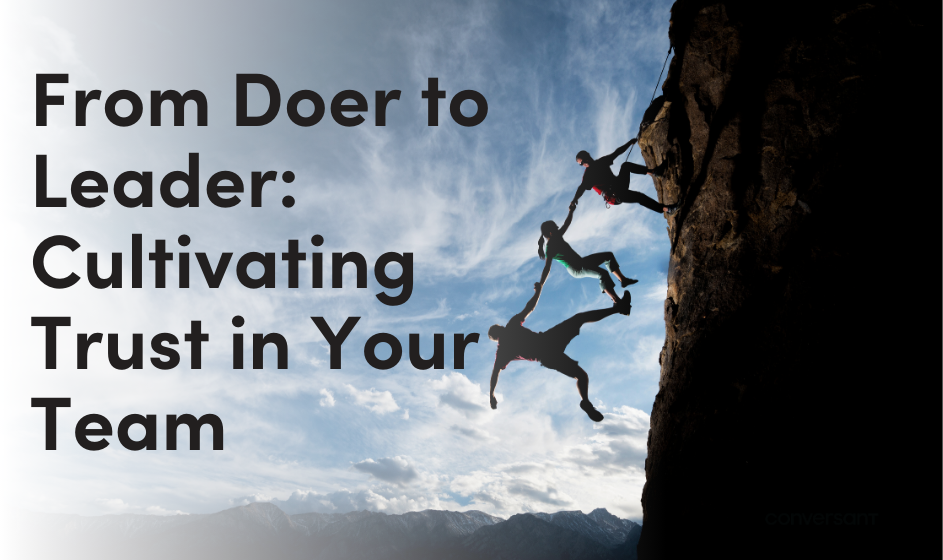Don Van Winkle joins the show to discuss the primary traits that lend themselves to “good” leaders. First and foremost, Mickey and Don discuss the overarching need for a leader to prioritize the evolution of themselves and the needs of the company, always striving for greater awareness of what both they and their organization will become tomorrow—and how to start working toward that future today. Please forgive the sound quality as the interview took place in a less than ideal location.
Highlights
- Some CEOs may have inherent traits that lend themselves to leadership, but truly good leading stems from the ability to evolve with the needs of the business.
- A connected leader should strive to balance confidence and humility, knowing that there is still work to be done and also that their team has the capability to make it happen.
- The smart CEO exhibits a level of interest in others and personal disclosure that inspires other people in turn.
- People want someone who will listen and appreciate what they bring to the table and who brings that to other functional areas of the company.
- The elements of connected leaders are deeply related to the financial wellbeing of our businesses, rather than mutually exclusive ideas.
Personal Evolution Exceeds Natural Abilities
0:27 Mickey: In Colin’s absence today, we’ve invited an executive and leader we admire, Don Van Winkle. Don, you and I have known each other for sixteen years. In the time that I’ve known you, you were a bank executive; president of a bank; chairman and CEO of a supermarket organization; CFO and COO of a retail clothing organization; director of a virtual CFO company; and in the last few years you’ve given council to a whole lot of CEOs.
1:33 Don Van Winkle: It’s fairly eclectic, but I’ve never been bored and I’ve always been able to add value. I’m curious how businesses and CEOs work, so it’s served me well.
1:44 Mickey: All of this time you’ve spent working with CEOs and being a chairman, what’s important for you about being an effective CEO? What does a good CEO look and act like?
1:56 Don: We have in our mind’s eye what a CEO “looks like,” how they dress and how they communicate. A lot of people are just born with that, but you can’t rely on it. You have to be able to evolve.
I see a lot of CEOs who have the natural attributes, the presence, the smarts, the pedigree, but if they don’t keep evolving and becoming more fully who they are, they end up running into a wall.
2:25 Don: I’ve seen people who don’t necessarily come to the table with all of the natural attributes. But because of their authenticity, compassion, vision and abilities to grow and make hard decisions, they become really good CEOs.
The Powerful Combination of Confidence and Humility
2:40 Mickey: This week I was at a company we have a new relationship with that is extraordinarily successful, very high growth and particularly modern, working in the data-driven, internet-rich world. I was with the CEO and he clearly sees that even though he has led this company to massive growth and been there for fourteen years, the company keeps growing into new challenges. He is interested in what is next for him and all of the people that count on him.
How do they need to evolve in order to be strategic for the next era of their company?
3:29 Mickey: I’m struck by this great combination of confidence and humility. He’s still open to the idea that there must be something to be better at today that they didn’t need to be great at yesterday.
3:57 Don: Good CEOs are not just evolving, they’re conscious of the impacts of their attitudes, presence, and vision on other people and they have humility about it.
The ability to admit when you are wrong in front of colleagues is powerful and way underused.
4:30 Don: If you’re wrong and everyone knows it, acknowledge it so you can move on. This is part of the personal evolution you need to go through in your stewardship of the organization.
The days of the “all knowing, I’m in charge, move forward, and just listen to me” methods are way behind us for enlightened, good leaders.
4:55 Don: The conditions are different; it’s a different generation, with different needs.
Openness as a Means to More Effective Work
5:58 Mickey: The rate of information exchange in our world today drives a level of dynamic, emerging, wild and unexpected change that requires communication to be open between the senior leadership and all of the other elements.
The smart CEO today exhibits a level of openness and interest and personal disclosure that inspires other people to expose.
5:47 Don: If you’re trying from the wrong angle and it’s inauthentic, it will backfire. If your motives and questions come from authentic curiosity, people listen and respond.
6:23 Mickey: When the United States was at war in Vietnam, there was a politician who had to report the deaths and progress of the war almost every day. Someone told him he needed to smile more, and it looked grotesque on camera while he reported body counts with a slight smile.
7:05 Mickey: Telling someone to be more humble, open and vulnerable is too instructive. That’s why I like the combination of confidence and vulnerability. Truly effective CEOs are really clear about where they’re confident and they’re really clear where they’re uncertain and inviting people to participate.
7:40 Don: Several years back, I was the CFO and COO of a sportswear design distribution. When I got there, there was no infrastructure but there were these great visionary artists. I got to put the infrastructure in to include the IT, accounts payable, and customer service.
I got to appreciate who they already were and to listen in order to tie it all together and coordinate so everything played off each other well.
8:14 Don: It was my first experience in orchestrating interaction. People want someone who will listen and appreciate what they bring to the table and that brings that to other functional areas of the company.
8:38 Mickey: As in our first episode, the distinctions between leaders, bosses and bastards are down to care and bridge, which you demonstrated in your story. You cared about the possibilities of their business and helped them create a much more effective bridge to where they wanted to go.
Investing in Leadership Development
9:29 Mickey: A question I hear a lot is, “Do leaders ever really change?” Some people say, “No, people are just how they are. Don’t waste your leadership development dollars.” What do you think about investing in the evolution of leaders?
10:18 Don: If you are conscious of what you bring to the table, but you’re aware of what you can improve, you keep evolving. You’re a better spouse, parent, colleague and friend.
The CEOs who think they’re “fixed” and are not consciously evolving end up becoming very flat and toxic to their organization.
10:44 Don: Leadership is inspiring the discretionary effort that separates commitment from compliance. Leaders have to be authentic and collaborative to inspire and be respected.
11:38 Mickey: You look at becoming fully ourselves as evolutionary. Is the evolution ever over?
11:43 Don: I don’t think so. If we ever get to the point where I am who I am and that’s all I am, I’m bored. We need to constantly evolve and there’s nothing you can’t refine in the development of yourself as a leader and a human being.
12:12 Mickey: The rate and quality of the evolution of enterprise never exceeds the rate and quality of the evolution of its leaders. Leaders do evolve.
13:31 Don: In terms of evolution, engineers typically are smart, problem-solvers, tenacious, but as CEOs, until they understand and appreciate ambiguity, they can be toxic CEOs. But when they can learn to appreciate that there are gray areas to people and situations and meld that into their other skill sets, they are good CEOs. People do not work like on/off binaries.
The Toxic Leader (a.k.a. The Bastard)
14:25 Mickey: What are some of the attributes of a toxic leader? For us, that would probably fit in the “bastards” domain.
14:42 Don: When I was in the grocery store business, I had a senior executive who was insecure—big physical presence, articulate, loud voice, but beneath all of that he was a very insecure human being. His insecurity undermined those he was supposed to be directing.
Never put insecure people—those who are not for other people and conscious of their own evolution—in charge of other people, because they have a primal need to undermine their credibility and who they are because they feel threatened.
15:31 Don: They use bullying as a way to get things done. It doesn’t work. If the leader can’t acknowledge where they’re doing well and not as well, there’s no point in engaging.
16:17 Don: I look for people who are genuinely interested in the development of other people
A true leader knows they are going to do well if the people around them are thriving.
17:13 Mickey: Last time we talked about the stories we leave in our wake. How do the stories that are told about a leader when he or she is not around affect their capacity to lead?
17:41 Don: A lot of entrepreneurs are people who did not fit well in the traditional corporate world, but the skill set that got their startup running will not take them to the next level. If they’re either unwilling to bring in the right level of management or talent or change themselves, they lose trust because they’re not willing to extend themselves through other people. I work with one individual like this; he’s predictable, not evolving. A fine human being, but he wouldn’t let people in.
18:31 Mickey: This would be an example of a toxic story about that person’s leadership. The story goes something like, “Really a wonderful person, used to be really valuable and no longer relevant.”
Evolving to Support Mission-Critical Results
19:06 Mickey: What do these different aspects of leadership evolution have to do with mission-critical results?
19:31 Don: People need to know and respect your basic intelligence in vision as a leader and at the same time appreciate that you acknowledge who they are and what they bring to the table. They can see through your whole perspective that you’re more collaborative, but you’re not a pushover.
Good leadership is a function of being intellectually curious about who the human being is that is delivering that skill set and desiring to bring out the best in them. A leader shows how they play off another individual and they look to you as the hub between them.
21:06 Mickey: I know you did a lot of commercial lending. Did any of this come into play when you were deciding who to give money to?
21:30 Don: Banking is a lot of technical analysis; you’re looking at numbers, so it’s very objective. This side is very subjective. You have bankers who do it totally by the numbers and bankers who understand and can feel whether “this is a good guy.” But you have to integrate those two.
21:51 Don: You see such a wide variety of executives that you start to identify patterns. How they treat people and who they hire tells me volumes.
Are they just flushing as much cash out of their organization and minimizing taxes, or are they truly thinking about building a balance sheet that’s more financeable and stable over time?
22:39 Don: To your question: absolutely. You have to get to know the subjective side and overlay that with the objective.
23:38 Mickey: There’s something important about that notion of: “Great leaders evolve.” I love that when you make decisions on where to risk capital, that you take into account the rigorous financial and technical analysis and the social awareness of who is going to execute all that. You have the elements of connected leaders deeply related to the financial wellbeing of our businesses.
24:34 Don: “The fixed man for fixed duties” is a threat today. It’s no longer relevant, but we still have some of that fixed man for fixed duties mentality. The people I look for now are very adaptable, curious and learning.
Connected leaders know their peripheral vision—their view of the world—keeps expanding hugely by aligning with other people who have skill sets they don’t have.
25:17 Don: Great CEOs not only create an environment, but they identify and consciously develop a high level of input with the people around them.
It’s very collegial and it’s gratifying, both to work with someone who is that CEO and to be that CEO.
25:35 Don: That flies in the face of a lot of information over the years about “what a leader is.” A leader is someone who is intentionally developing and bringing out the best in people, even in a “selfish” curious way, because he or she knows we’re better facing the uncertain world and making the best of it for all of us.



